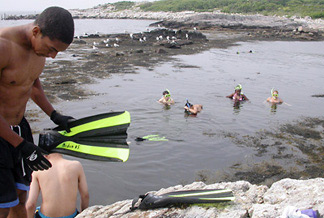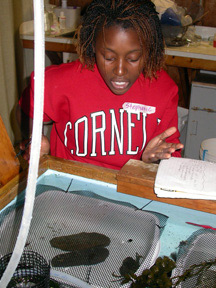From city streets to life in the tide pools, new program fosters Cornell students' interest in marine science
By Krishna Ramanujan

A new Cornell program connected to Shoals Marine Laboratory in the Gulf of Maine aims to introduce freshmen from all walks of life, but particularly underrepresented youth who tend to hail from urban areas, to studying marine science.
The yearlong "Campus to Coast" program, conducted at the Shoals Marine Lab in the summers and on campus in the fall and spring, is supported by Cornell and the National Science Foundation's (NSF) "Opportunities for Enhancing Diversity in the Geosciences" program, which includes ocean sciences. Campus to Coast helps fulfill an NSF mission to have the racial, ethnic and economic diversity of people within science professions reflect that of the U.S. population.
In the program's inaugural year, organizers worked with admissions counselors last spring to identify minority and economically disadvantaged students with a potential interest in marine science and offered them fellowships after they were accepted to Cornell. Currently, 10 Cornell students participate in the program, with two additional students in a sister program at the University of New Hampshire.
"A real bonus of this program is that these students not only gain an appreciation of the marine sciences, but as freshmen, they develop personal relationships with Cornell's marine faculty," says Jim Morin, Cornell professor of biology and principal investigator for the program.

The program began this summer at Shoals on Appledore Island, six miles off the coast from Portsmouth, N.H. There, most of the students attended a three-week, four-credit course on ocean sciences and scientific techniques before their freshman year, all expenses paid plus a $750 stipend. Those who were interested but could not attend the three-week course were invited to a four-day, expense-paid trip to Shoals, where they were introduced to marine biology, conducted a snail and crab predation experiment, explored the island and snorkeled in the tide pools.
"Many of these students had never been exposed to a non-urban environment," said Myra Shulman, a senior research associate in the Department of Ecology and Evolutionary Biology and co-principal investigator of the program. Shulman said that many students quickly changed from being afraid of the screaming gulls to becoming comfortable and fascinated by the natural world.
"I think they were excited about the idea that you could really get in close to nature and learn about everything from very tiny organisms to seals and birds," she added.
During the academic year, Campus to Coast fellows are mentored by a marine science faculty member. In the fall, the students go on biweekly field trips to learn about local ecosystems in relation to marine ecosystems and to network with researchers. Field trips this fall included a trip to Dryden Lake with Cornell ecologist and evolutionary biologist Nelson Hairston and a hike down the gorges of Robert Treman State Park for a lesson on how life in streams differs from ocean life.
In the spring, students will use marine science topics to fulfill their first-year writing seminar -- from scientist profiles to one-minute radio spots -- aided by visits to marine science labs on campus and research and interviews.
In the pre-sophomore summer, students in good academic standing will have an opportunity to return to Shoals Marine Lab to take one to three more courses on the island, with a small stipend and all expenses paid.
In addition to the NSF, the program is supported by Cornell's Division of Student and Academic Services, College of Arts and Sciences and College of Agriculture and Life Sciences, as well as by the Shoals Marine Laboratory, University of New Hampshire and The Leadership Alliance, a consortium of 31 research and teaching institutions whose mission is to support underserved and underrepresented students pursuing careers in research.
Media Contact
Get Cornell news delivered right to your inbox.
Subscribe